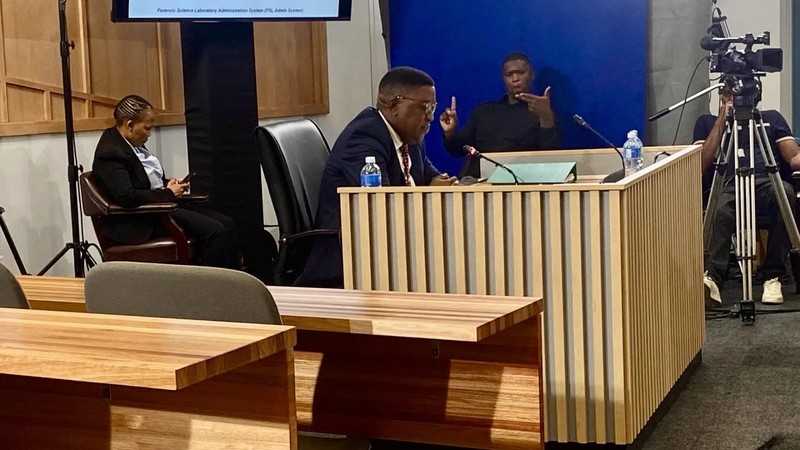Multiple mistakes in the ballistic report prepared by an SAPS forensic expert was central to the testimony of Brigadier Mishak Mkhabela, the national head of Ballistics Section of the SAPS, at the Madlanga Commission of inquiry on Monday.
Mkhabela, who is stationed at the Forensic Science Laboratory in Silverton, Pretoria was quizzed about the potential sabotage when he testified about what transpired with the forensic report linked to the murder case of Armand Swart, a Vereeniging engineer, who was gunned down on April 17, 2025, in a case of mistaken identity.
He said that a Captain Makgotloe (Mkhabela did not provide a first name) was responsible for the report on the weapons and exhibits recovered from the suspects linked to Swart’s murder.
The hitmen allegedly mistook Swart for a colleague who had exposed corruption in a tender linked to Transnet. The company Swart worked for had uncovered overpricing of 4,650% on small engineering parts at Transnet.
Controversial businessman Katiso ‘KT’ Molefe was charged with Swart’s murder, alongside three alleged hitmen, Warrant Officer Michael Pule Tau, Musa Kekana, and Tiego Floyd Mabusela
At the heart of the matter were the complaints by detectives that the ballistic report had omitted results in reference to matches of other hits to the weapons recovered from suspects in Bramley (where suspects in the Armand Swart’s murder case were arrested).
Another complaint was that of discrepancies in the initial affidavit (Makgotloe’s) of May 2024, and the alleged backdating of the amended affidavit that sought to address the initial problems.
Mkhabela told the Commission about an incident where he was visited by the investigators on 8 January 2025.
“Their complaint was that they came to look for a statement which they discussed with the analyst. Their concern was that there were omissions of results in the (ballistic) statement. I then asked them to give me a copy of that statement,” Mkhabela said.
Mkhabela told the Commission that upon receiving the complaints, he had the matter investigated.
“Through the investigation, we ended up retrieving this (the ballistic) report because it was wrong, and replaced it with the correct one, where there is a reference to these 15 cartridge cases, and the AK-47. Hence, I am saying, only through the investigation can you tell whether the mistake was deliberate tampering,” Mkhabela said.
Another underlying complaint was that the detectives had met Makgotloe in May 2024, and he told them that the weapons in question were linked to multiple cases. However, the detectives were surprised when this crucial detail was not in his ballistic report.
Chief Evidence Leader, Advocate Matthew Chaskalson SC put it to Mkhabela that there was one glaring mistake which appeared to be a ‘deliberate attempt to sabotage the prosecution’ wherein forensic expert Captain Makgotloe wrote an incorrect case number on the ballistic report.
Chaskalson further highlighted that, had this report reached the hands of the suspects’ defence attorneys, they would have used it to say that their clients were not linked to the crimes because there is a different case number in the report – this would have sabotaged the State’s case.
In response, Mkhabela stated that he would have to go back and investigate whether the file had the same case number when the specimens (exhibits) were booked into the lab, because forensic experts are required to write the information as it is.
However, Chaskalson pointed out to Mkhabela that there is a third version of Makgotloe’s affidavit stapled in the case file, and that the case number no longer reflects the previously flagged incorrect one.
Mkhabela said he was not aware of the third version of the affidavit with the corrected case number.
Makgotloe had stated in the ballistic report that some bullets had not been suitable for microscopic comparison due to damage.
However, detectives who testified last week said that when the same exhibits were taken to an SAPS lab in Amanzimtoti in KwaZulu-Natal, a forensic expert there was able to link the weapons to different case dockets.
The Madlanga Commission of Inquiry is investigating allegations of collusion and corruption between politicians, senior police, prosecutors, intelligence operatives, and elements of the judiciary, levelled by KwaZulu-Natal Provincial Police Commissioner Lieutenant General Nhlanhla Mkhwanazi.
The testimony continues
